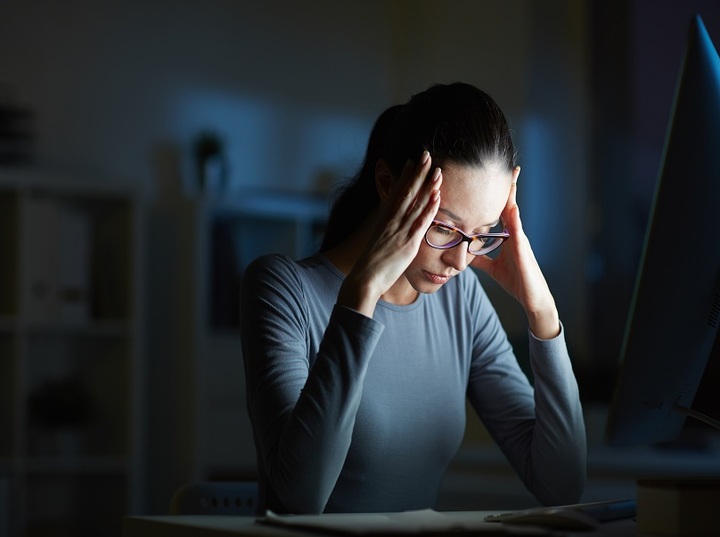5 Behaviours That Are Worsening Your Anxiety
الجسم
Many people experience anxiety disorders of varying degrees and types, such as generalised anxiety disorder (GAD) or something more specific such as social anxiety disorder (SAD) or health anxiety. These are associated with a consistent uncontrollable worry or fear, often accompanied by increased heartrate, poor concentration, and restlessness, amongst other things. One challenge of anxiety is that it can often be self-sustaining in that people can become anxious about their own anxiety symptoms, and many people find their anxiety encourages certain unhealthy behaviours that can actually worsen anxiety and prolong the recovery process. These behaviours can be easy to adopt without you realising as anxiety disorders can be exhausting and therefore they often become an easy outlet for symptom management. However, it is important to recognise when you are doing them so you can begin to make useful changes that will genuinely help to make anxiety disorder a less defining feature of your everyday life.
Here are 5 behaviours that you may be doing that could be worsening your anxiety:
- Avoidance- Although avoiding scenarios that may trigger your anxiety (e.g. not going to social gatherings or to the shops) can bring a sense of relief, this is actually an enemy to your recovery. This means your anxiety will always be around to control your life, and once you begin avoiding some situations you may notice it creeping into others. Overall, it is both unrealistic and unsustainable to expect your mental health to improve by simply avoiding the problem. While approaching a situation directly may be extremely daunting, the support of a therapist can enable you to explore your anxiety in a safe space at a rate that suits you.
- Engaging in unhealthy coping mechanisms- This can include using drugs and alcohol which can negatively impact your physical wellbeing and can cause feelings of anxiety by themselves. However, using unhealthy coping mechanisms in general leads to a third problem. They enable you to develop a psychological crutch whereby your brain relies on them to cope. Eventually you will lose the ability to manage your stressors without these behaviours, and it becomes even harder to get this ability back. This is why anxiety treatment often involves both medication and psychological support, so that you are able to eventually develop effective coping mechanisms without the reliance on medication or other unhealthy strategies.
- Seeking confirmation for your fears- This is especially common with those with anxiety around their health, as they may google their symptoms to find a diagnosis that matches their extreme fears. Although they may admit to having anxiety, they may see this as proof that in this case they actually have a disease. This behaviour is normal in everyone (e.g. if you are scared of sharks you may look up the number of shark deaths before you swim at the beach). However, in people with anxiety these behaviours can make their feelings seem less irrational, which will only make them harder to overcome. Understanding that your anxiety may be irrational in your current surroundings is a key part of seeking the support you require.
- Spending time with negative people- Spending time with family and friends should make you feel relaxed and supported and can be a great way to enjoy yourself. However, one of the worst things you can do is spend time with people who cause tension and stress, even if they are distracting you from your problems. Pay attention to who you feel uncomfortable around, isn’t supportive of your mental health journey, or makes you feel inadequate. The negativity is likely to rub off onto you and only cause your anxiety to worsen. You may feel unworthy or unable to overcome your anxiety even though this is not the case. Surrounding yourself with people who uplift and empower you will enable you to feel fully supported and more able to face your anxiety.
- Bad sleeping and eating habits- This can worsen various different struggles in your life, including anxiety. Eating and sleeping sufficiently has a direct impact on your mood and ability to cope with stress, therefore you may be more likely to find certain situations more overwhelming and you may find your normal coping strategies feel less effective. Also, keep note of your caffeine intake throughout the day as this directly increases your heart rate and can increase anxiousness. As mentioned above, anxiety can be incredibly tiring, therefore caring for yourself through good food, sleep, and exercise will provide you with greater psychological capacity to manage your symptoms in healthy ways. Additionally, if you experience anxiety around your health (e.g. chest pain, digestive issues), healthy sleeping and eating habits can minimise these experiences and help you feel more in control of them.
These 5 behaviours are just one of the many ways that you can fuel your anxiety, making it more difficult to manage and progress to recovery. It is important to learn what they are and how they can impact you so you can check yourself and make changes before they cause any significant effects on your mental health (e.g. create a journal, be open with family).
Occasional anxiety is common, but chronic feelings of worry, dread, and fear towards specific situations or throughout your day are not. If you experience this, it is important that you seek professional help as the more complex your anxiety becomes, the more challenging it will feel to overcome, and you will be more likely to adopt unhelpful behaviours. If you already have received help for your anxiety but still carry out these behaviours it is important that you disclose this during therapy.
Here at the Blue Tree Clinic we have an abundance of professional support we can offer from psychiatrists, clinical psychologist london, therapists, and nutritionists who can provide you with the tools to overcome your anxiety and develop helpful, effective, and healthy coping strategies.
Source Url : https://thebluetreeclinic.com/5-behaviours-worsening-anxiety/














تعليقات